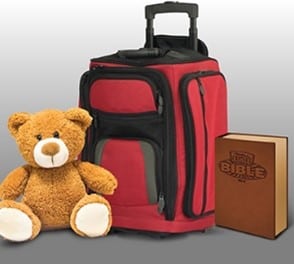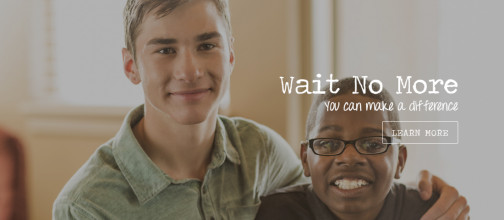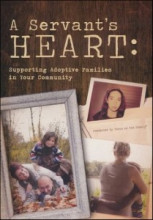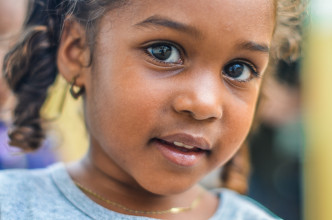Preview:
Dr. Sharen Ford: Parents, if you’re struggling with a child you’ve adopted, you’re struggling with a child you … you’re taking in for foster care, God says, he’s there. Ask and it will be given to you. Seek and you will find. Knock and the door will be open to you.
End of Preview
John Fuller: This is Focus on the Family and today you’ll be hearing from Dr. Sharon Ford about caring for children in foster care and there’s a special event called Wait No More coming soon to your area. Your host is Focus president and author Jim Daly. I’m John Fuller. And God has promised to be with us and answer our prayers even during the most challenging times of our lives and certainly for many, adopting and providing foster care for children can rank right up there among some of the most challenging of life circumstances.
Jim Daly: It’s true, John, and I love the passion that Dr. Sharen Ford speaks with in that brief clip there. And, uh, we’ll hear more from her in just a minute. Uh, this is such a difficult topic because oftentimes parents who want to do the right thing by adopting find out how hard it can be, and we want to be forthright about that situation. I know you and Dena have gone through quite a bit in your adoption.
John: Well we have. It’s not uncommon to, uh, find some unexpected, uh, surprises along the way. We thought, honest in my earthly pride I thought, well we have five kids, what’s one more?
Jim: You can do it! (laughter)
John: And – and God has rocked my world through this child in good and yet hard ways.
Jim: Yeah, so John, uh, as Dr. Ford just said, have you felt God’s presence with, with uh that situation?
John: Well sure, I mean we’ve prayed and prayed and prayed. We’ve laid a groundwork of prayer and then we come up off to what I call the Popcorn prayers…
Jim: (Laughter).
John: … just, it’s in the moment and I’m like, “Lord, I need your help with this circumstance right now.” You know this, I mean you’ve raised kids, and you’ve had foster children as well.
Jim: That’s true, we’ve had some challenging experiences, uh, with those kids in our home too because they’re coming with stuff, you know? They’re comin’ with that baggage and, John, I think it’s natural for all of us, uh, to prefer a life of ease and comfort, but, uh, faithfulness usually requires a harder path, and we’re gonna talk about that today and maybe even challenge you about seeking a life of commitment over a life of comfort and ease.
John: That’s a good way to put it, and as you mentioned, we have a presentation from Dr. Sharen Ford. She’s a nationally recognized child welfare consultant and worked for the Colorado Department of Human Services in the division of Child Welfare Services, in fact. More recently, she’s been serving here at Focus on the Family in the area of child advocacy. And Dr. Ford is the Program Director for Foster Care and Adoption.
Jim: Yeah, we’re really blessed to have her here on staff. I came out of the foster care system when I was in 4th or 5th grade, and that’s one reason I feel it’s so important for you to be aware of what’s going on when 400,000 children here in the U.S. are in the foster care program. Not all of those children are available for adoption, about 25%, 100,000 of that 400,000 are, and that’s a big number. Uh, I think your eyes will be opened today as you hear Dr. Ford talk about her passion, my passion, and what’s happening with foster care.
John: And she was speaking at the Christian Alliance for Orphans Summit in Chicago. And here now, Dr. Sharen Ford on Focus on the Family.
Dr. Ford: Today across this country there is such a great need. A need for children to be safe. A need for the brokenness to go away. For the hurt and pain to go away and I sometimes cry out to my God about how I need him.
See, as a worker, you come to God, asking him to intervene, knowing that everything that you do every day affects someone’s life and if God doesn’t do it, who will, because I can’t. I need the Lord and I need God’s people. I need God’s people to come and be the answer to my cry, (singing) I need Thee, O God, I need Thee. Every hour I need Thee. O bless … (speaking) bless me with your people, O God.
Bless me with people who would hear your clarion call and come and answer the need, because there are children around this world, around this great nation, who are hurting. Children whose parents are choosing to give their food stamps away to buy drugs. Women who are working two and three jobs and letting the boyfriend come in and because he doesn’t know how to parent, because he doesn’t really care to parent, he’s harming the children—a need so great that our children are being hurt.
Some of the number one deaths around this country are because men are living with women and as they live with those women, they harm their children. Women are making choices. Not good choices. And workers are having to come in and do what workers do, do what government does and government does what? We protect. It is our job. It used to be my job. I don’t have that job anymore, I have a new job (laughter), but when it was my job to protect the children, to investigate, to go in and to know what is going on, the need is so great around this nation in every state. Whether your state is in the newspaper every single day or not, there is a need.
And workers go in, day in and day out, they themselves, filled with trauma. Can you imagine going in every day and having to make the decision, “Do I protect and take away? Do I leave that child at home?” And workers are saying, “It’s me; it’s me; it’s me, O Lord, standing in the need of prayer.”
I’m in the need of prayer, knowing what to do, because what I do or what I fail to do impacts a child’s life, impacts that family’s life. And so, I continue to say, “God I need you.” I need you for -for direction. I need you for guidance. Workers need you every day. The court needs you. The judges need you. The Guardian Ad Litems need you. The CASA volunteers, they need you. And the birth families of those children, God, they need you. I need you.
(Applause)
A need so great that only an answer from God and his people could meet the need.
Those some 102,000 children are standing in the need of prayer. They’re standing, hoping today that God hears them saying, “God, it’s me; it’s me. It’s not just my worker standing in the need of prayer, God, it’s me; it’s me. It’s me, God, wanting to leave foster care, wanting to have my forever family. I don’t want to age out of the system. I want a mama. I want a daddy. And I’m wondering, God, today will you send me my mom and my dad?
I – I’m looking for some people who’s willing to be gap-standers, who’ll stand in the gap. Some of those children will find their forever families and some of them won’t. But will you stand in the gap for them? Will you stand in the gap for the workers who are caring for them, who are making the hard decisions about, “Can I let this child go to the Smith’s, to the Roger’s. Can I let go?”
Do you know that that’s a hard decision to make? Can I trust that family? Have … do they really, really, really want this child, this sibling group? Do they really want to be parents to the children that I’ve had on my case load? That is an enormous decision to make.
No worker wants to let a child go to their forever family, only to have them come back in the system again. Will you stand in the gap for those hard decisions that need to be made?
Will you stand in the gap for the families, who when they take those children in, that they do so forever? Forever! Forever’s a long time. You know, like you … when you got married. (laughter) She was cute, and he was handsome. Not so much today (laughter), but you’re still forever. Forever. In this thing together. Will you do that? ‘Cause our – out families stand in the need of prayer. Adopting a child isn’t easy. It is a life-long commitment. And all of our families need prayer. Whether you adopt one or take a whole houseful of seven, all of our families are standing in need of prayer and – and one of the things that can help make the difference for a family is respite care. And you say, “Well, what’s respite?” Respite is what that family needs at the point of when they need it.
Respite might mean a time, a Calgon moment where they go and just sit in the bathtub with no kid knockin’ on the door.
(Clapping)
It might mean going to the golf course and just putting the ball, don’t – don’t – not playin’ the course, just putting the ball. Just some you time. Or maybe some couple time, so that the couple stays a couple, so that families stays a family for the children.
I used to dream about what God’s Word said, about what he wanted for his children. That brought hope to me, brought hope. And as God brings hope, he showed me a vision in the Scripture and it’s found in the book of 1 Kings, the 18th chapter, verse 43 and 45. “And the man of God says, ‘Go and look toward the sea,’ he told his servant. And he went up and looked. ‘There is nothing there,’ he said. Seven times Elijah said, ‘Go back and look.’ The servant reported, ‘A cloud as small as a man’s hand is rising from the sea.’ So, Elijah said, ‘Go and tell Ahab; hitch up your chariot and go down before the rain stops you.’” I have seen a cloud on the horizon and God’s rain is coming and it is the church being the answer to those who stand in need.
When you’re standing in need, God’s Word is what you stand on and as someone who has stood in need and moved from state government now to work for Focus on the Family, I’ve gone to -from being retired. Someone told me just the other day at work, the Bible doesn’t say the word “retire.”
(Murmurs)
In state government, you can’t be an advocate. You can only be an educator. You can only educate legislators about a situation. When they ask questions, you could answer their questions.
But now being at Focus on the Family, I can advocate for God’s children in a very different way. And one of those advocacy pieces is the importance of wrapping support around families, whether you’re a foster family or an adoptive family, even birth families. The Word says that He gives you promises. I know that God’s Word says, “I’ll never leave you, nor forsake you,” according to Joshua 1 and 5. “God is our refuge and strength, an ever-present help in trouble.”
Parents, if you’re struggling with a child you’ve adopted, you’re struggling with a child that you’re taking in for foster care, God says He’s there.
I see a cloud and that cloud is growing. And as it grows, I know that God will bring a cup of cool water to those who are thirsty. He’ll bring food to those who are hungry, ‘cause we have some children in this nation who are yet at home, yet being abused, yet being neglected and they’re trusting that someone will hear and say, “Come. Come under my hedge of protection. Let me nurture and love you.”
That there are some families who will take them in and that there are yet, some other families – other families – who after they’ve taken people in, that families will come and wrap around them and be the comfort and the support that they need, so that they can continue to be what God says they need to do and be for children. Amen.
(Applause)
John: Dr. Sharen Ford speaking from her heart as we wrap up this portion of Focus on the Family with Jim Daly. Uh, she was speaking at the Christian Alliance for Orphans conference in Chicago, Illinois.
Jim: And John, you could hear Sharen’s heart for those children. Again, she used to work, uh, in the Child Welfare Services here in the state of Colorado advocating for children each and every day. And she has committed much of her life to helping these children and I appreciate what she shared. Now, for the remainder of the broadcast, I want to share a conversation we recorded a while back with a couple who had been actively involved in foster care and adoption and respite care for foster families. The Schneidler’s are really great people with very big hearts. And I think you’ll be interested and hopefully motivated, uh, by hearing what they have to say on this topic.
John: Andrew and Michele Schneidler are from the Seattle area and are former foster parents. And they’ve adopted three children. And both have been active in helping children find permanent homes.
Andrew is the founder of The Children’s Law Center of Washington State. Let’s go ahead and listen to the conversation we had on Focus on the Family as they describe how they became involved in foster care.
Michele Schneidler: We were married for ten years. We started to try to have children and we were infertile. And so – and I already knew I wanted to adopt, uh, since I was fifteen years old.
Jim: Huh.
Michele: And so, it wasn’t that difficult for us move into the adoption world…
Andrew Schneidler: She knew she wanted to adopt…
Michele: Yeah.
Andrew: I – she asked me when we were dating and I said, “Oh sure. Sure.” ‘Cause we were dating.
Jim: Right. (laughter)
Michele: He’s trying – trying to get the girl. Right.
Andrew: But – but frankly I never really thought about it. And then when I did think about it, I was actually intimidated by the idea.
Jim: Why?
Andrew: ‘Cause it’s so – because so much of it is unknown. So much of it is beyond my control. And then everyone hears stories where, “Gosh, I don’t want to have this or have that happen.” Kind of thing. And actually that – I carry that – now I’m a huge proponent of it. But, I remember, a specific prayer where we were praying about what we should do. And my prayer went something to the effect of, “Okay, God, if you ask me about this whole adoption thing. If you ask me if I’m open to it. I’m going to be honest. I’m not open to it.” But fortunately, my prayer continued. It said, “But I’m open to becoming open to it.”
Jim: Okay.
Andrew: And that’s sort of become my mantra through life. But also, when I’m encouraging people. It’s okay to say, “I’m not open to this.” But are you willing just to be open to becoming open? And that was – that was all God needed.
Jim: (laughter) The Lord’s got you when you say that.
Andrew: That’s the toe – the – the foot in the door.
Michele: Yeah.
Jim: He hears that. Let me paint the picture for the listeners because when you – you’re not engaged with the foster system you don’t really know what’s happening. We have just over 400,000 children in the United States, uh, that are part of the foster care environment. These are children where the court has decided the parents, for whatever reason, uh, can no longer, you know, function in that role. And there needs to be separation. Um, the 400,000 – about 100,000 of those children – the parents have lost parental rights and they’ve become wards of the state. And the parents are no longer involved in their children’s lives at all. It’s usually a big wall hard and fast. And, uh, those children tend to go to foster, uh, care and they move to several homes. Um, they’re dealing with a lot of emotional, um, scarring. Uh, “Why are my parents not loving me? Why am I in this person’s house?” I was that foster kid. You know, my mom died when I was nine and our – our, uh, stepdad walked out. And I ended up for one year in foster care and it was tough. Um, you know, I didn’t – it was the oddest thing. Uh, when Christmas came around, they gave presents to all their kids, but not to me.
Andrew: Oh man.
Jim: It was that bad.
Andrew: Ugh.
Jim: And that as a child – as a nine-year-old – I mean that really traumatizes you. And it makes you think, “What’s wrong with me?”
Andrew: Mm hmm.
Jim: “Where did I go wrong?” And, uh, so many kids experience that. There are some – many wonderful foster parents and I don’t mean to slight the handful that do it poorly.
Andrew: Mm hmm.
Jim: But the reality is, um, we need more Christian families engaged. And, uh, that’s what it’s about, isn’t it?
Andrew: Yeah.
Michele: Well, and I think, too, it’s important to help Christian families who want to get it engaged know how to engage with a child who’s hurting. Uh, what we see is parents will get involved with foster care and adoption for great reasons and they want to help a child in need they have room in their home, so they bring a child in. And they don’t – they don’t even think about the reality that the child is grieving.
Jim: Right.
Michele: And is going through loss…
Jim: The loss of their parents.
Andrew: Right. Yeah.
Michele: …and is confused. And doesn’t want to be there. So that’s the part where support is needed.
Jim: Right.
Michele: You know, a – a wider circle of support. Not just foster parents and adoptive parents, but…
Jim: Yeah.
Michele: …the, you know, relatives and friends and church needs to…
Andrew: The community.
Michele: The community needs to rally around foster parents…
Jim: Yeah.
Michele: …to help them love these kids that are grieving. They’re going through loss.
Andrew: And adoptive parents – and adoptive parents as well.
Jim: Right.
Andrew: Um, it’s just the beginning of the journey when the child is placed.
Michele: Absolutely.
Andrew: And that is absolutely the truth. So often I think what we see is sort of like, “Oh yay! You’ve – you adopted. You’ve crossed the finish line. Well, see you later.” And that…
Jim: Right.
Andrew: …is really where we need to be going – that’s when the tape is cut when you’re starting the, uh…
Jim: Right.
Andrew: Or that’s where the beginning of the race is.
Jim: And there’s really three categories we’re talking about here. One is when a person adopts out of foster care. Um, which, you know, that’s permanent and that is saying I’m taking this child in – or these children if they’re a sibling group – and they become mine. And, uh, that is a beautiful thing. Then you’ve got regular – what I would say is regular foster care where it’s a temporary situation. It may be a year. It may be a few months until those par – biological parents, um, get their life in order to a degree that the state…
Andrew: Mm hmm.
Jim: …is satisfied that they can continue to parent. And those children will go back with them. And then there’s the respite care that we talked about which is short term. Could be a long weekend. It’s what I call “grandparenting” for foster (laughter).
Andrew: Mmm. Mmm.
Jim: You are able to take these children in to the home for a couple of nights. Maybe a week or two to give that foster family a breather and let them get back to some regular routines. Andrew and Michele, um, you’re foster experience led you to adopt. And that was something, Michele, you expressed a moment ago – you’re desire to adopt. You came along, Andrew, eventually.
Andrew: Right. Yes.
Jim: I don’t know the time it took.
Andrew: Yes. I’m like a big ship. I slowly come around but once I’m on a heading.
Jim: (laughter) Was it a year? Or months? Or…?
Andrew: I think it was – I think it was a year. Yeah.
Michele: Yeah.
Jim: And so, talk about what happened. Uh, you ended up adopting one or – or more children.
Michele: Well, actually our first adoption was a private, independent adoption. So, we, um, took Ike home at birth and then we slowly warmed up to the idea of foster adoption. So actually, our second and our third. Gabriel is our second who’s eleven now. And Anna’s our third who’s almost eight. And we adopted them out of foster care.
Jim: How old were they when you adopted the – the other two?
Michele: So, Gabriel came at ten months old, so we had in our mind, “Okay, we want to help a child come out of foster care. And so, let’s go young so that we have as much as opportunity to attach as possible. And, uh, we were pretty ignorant to the whole idea that there could be long-term special needs from the trauma that he endured in utero. So that was my first experience as a mom feeling overwhelmed that I – I couldn’t provide for his needs. I couldn’t care for him, um, because he was hurting so much.
Jim: What were the special situations for him?
Michele: So, he was traumatized in utero, um, by meth exposure and by the time he came to us he had some, um, hemispheric delay. So, he was dragging one side of his body. He had to be in weekly occupational therapy for two years and he was screaming. He had this, um, horrific screaming that we later found out was because his skin felt like pins and needles.
Jim: Right.
Michele: So, we were – we were the classic couple trying to attach with our son and we’re holding him…
Andrew: They said, “Oh, touch him more.” ‘Cause then we would touch.
Michele: …we’re rubbing him. We’re looking into his eyes and it was traumatizing him the whole time.
Andrew: Every – every touch on his body. Now he’ll say, “Daddy, you know like when you’re foot falls asleep and it tingles and if you touch it – he goes all my body felt like that.”
Michele: Yeah.
Andrew: And so – and then you imagine if you squeeze someone tight that would just drive you nuts.
Michele: Oh. Yeah.
Jim: Oh my.
Andrew: And that’s what we were doing.
Jim: Yeah, that takes a lot of patience and a lot of understanding. And a lot of, uh, studying to better grasp what that child is going through. What about your third child?
Michele: So actually, after Gabriel we shut down our license.
Andrew: Yeah.
Jim: Yeah.
Michele: So, we just thought “Okay, this what we can…”
Jim: All consuming.
Andrew: Yeah. We were exhausted.
Michele: Yeah. And, um – and then fast-forward a couple years and the Lord was very strongly putting on our heart that we had a little girl and, uh, inviting us to go after her. So, we had to go back and renew our license and then waited and waited and waited. And then Anna came to us at ten weeks old.
Jim: Mmm.
Michele: And she took three years before, uh, we adopted her. So, we actually – she actually went – almost went home – back to her birth mom, uh, halfway through – eighteen months in. And then, uh, that didn’t work out and so we ended up adopting her. But there’s a Scripture in Isaiah 1:17 that says, “Learn to do good. Seek justice. Defend the oppressed. Take up the cause of the fatherless.” And I was reading that one day and I usually focus on the part that says, “Take up the cause of the fatherless.” But the Lord, brought me back to the “learn.” And he showed me that this is a journey that people are walking into.
Jim: Mmm.
Michele: And it’s not going to be easy. It’s not going to feel natural. It’s a learning. And so, we as a church need to have environments where we are teaching and we are patient and we are walking by example and we’re walking alongside people and saying, “This is really hard.” Like how you took in two boys and it was hard. And you took a break, but you didn’t give up. And I love that. And I – because God says that we’re going to learn. This is going to be a learning journey. So, I think that’s one of the many like 5,647 lessons that he’s taught me.
Jim: (laughter) That’ so true.
Michele: But that word “learn” has been really powerful for me.
John: Andrew and Michele Schneidler are speaking from their hearts about caring for kids without a mom or a dad. And the Scripture exhorts us to do that. Uh, Jim, what would you say now to those who’ve heard this today and they’re wondering what can we do to help? What can I do? Maybe they’ve been praying about adopting a child from foster care, but they need some guidance and some next steps.
Jim: Well, if you’re considering foster care or adoption. I want to encourage you to visit our website. That’s a great place to start. There you’ll find more information and resources to educate you and help you prepare for that decision. Uh, it’s not easy for these kids who are saying, “Will you love me even if…?” And fill in the blank. It could be a whole host of things behaviorally. Uh, but if you’re feeling a tug on your heart the Lord may be speaking to you about being that vessel to help a child. And, uh, at the website you’ll find more information about a Wait No More event coming to your area and John will give more of those details. And then, uh, if you’re able to provide foster care or adopt for whatever reason, let me encourage you to make a pledge to Focus on the Family and support the Wait No More program. I think everybody can do that. Uh, every $50 you give helps a child in foster care connect with a loving family through Wait No More our foster care and adoption program. And if you can do that on a monthly basis, you’ll help even more families and more children.
John: And you can learn all about Wait No More and make a pledge when you visit focusonthefamily.com/broadcast. Or call 800, the letter A, and the word FAMILY.
Now we have Wait No More events coming up in Ashland and Frankfort next month, and we’ll be in Ashland, KY on Tuesday, the 24th of August at Rose Hill Baptist Church. A couple days later in Frankfort, on Thursday, August 26th, at Buck Run Baptist Church.
All the information you need to register for these free events, or to learn more to come alongside other foster or adoptive families, just check out our website: focusonthefamily.com/broadcast.
Thanks for listening today to Focus on the Family. On behalf of Jim Daly and the entire team, I’m John Fuller inviting you back as we once again help you and your family thrive in Christ.























